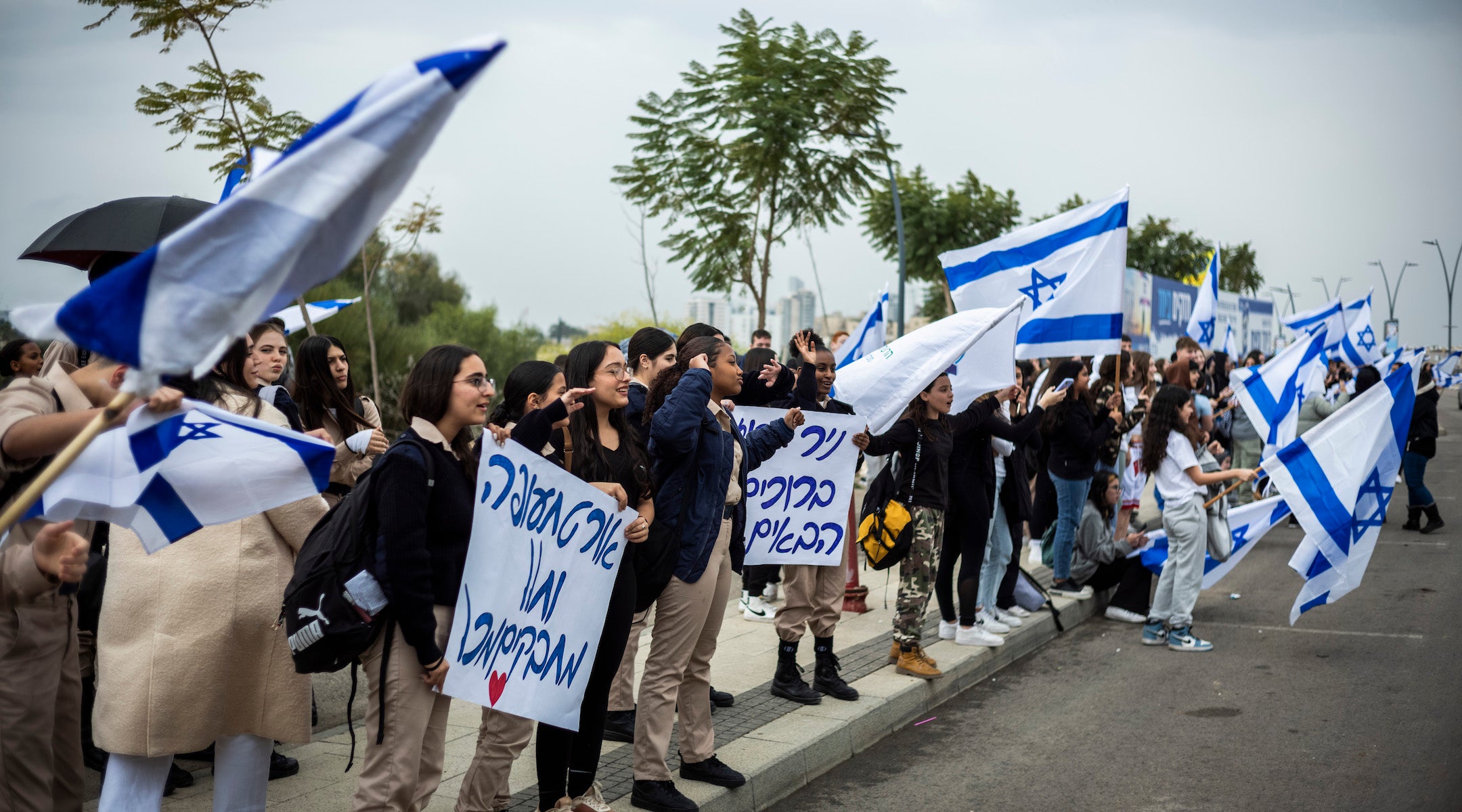Uncategorized
US soldiers stationed in Kiryat Gat turn sleepy Israeli city into an unexpected hotspot

At one of Kiryat Gat’s main shopping complexes, U.S. Army camouflage does everything but blend in.
American troops in fatigues move between shawarma stands and sports-shoe stores, a new presence in the southern industrial city, part of a multinational civil-military coordination center set up to monitor the Gaza ceasefire. The center, housed in a converted logistics building about 15 miles from the Gaza border, opened last week with roughly 200 American personnel as well as smaller contingents from at least eight other countries.
By the weekend, the sight of Americans in uniform had become routine. “Big guys, all in perfect formation,” one shopkeeper at the BIG mall told the Walla news site, “like they came out of a Hollywood movie.”
Cafes, restaurants, and food delivery services have been “working around the clock” to accommodate the city’s new foreign guests. On social media, commenters called the deployment “a new world order,” noting that Kiryat Gat was trending for the first time in years — and not because of pop star Ninet Tayeb, still the city’s most famous export.
City officials have leaned into the moment. Mayor Kfir Swisa publicly welcomed the deployment, telling residents the personnel were “received with open arms,” framing the center as both a security asset and an unexpected local boon. Senior U.S. officials have visited the site in quick succession, including Vice President JD Vance and Secretary of State Marco Rubio, who said U.S. ambassador to Yemen Steven Fagin would oversee the civilian side of operations, while U..S Central Command’s Adm. Brad Cooper would handle the military track, including Hamas’s disarmament.

U.S. Vice President JD Vance speaks alongside Steve Witkoff, U.S. Special Envoy to the Middle East, Admiral Brad Cooper, commander of the United States Central Command, and Jared Kushner, during a press conference following a military briefing at the Civilian Military Coordination Center in Kiryat Gat Tuesday, Oct. 21, 2025. (Nathan Howard for The New York Times)
During an interview on Channel 12’s current-affairs program, host Avri Gilad asked Swisa whether the arrival of the Americans had changed life in the city. Swisa replied that it “puts Kiryat Gat on the map,” adding that “now the Americans have also realized what many young Israelis already know” — that the city’s location near the cross-country Highway 6, its rail link, and its “rich cultural and sports scene” make it an appealing place to be.
Gilad cut in, “They didn’t come here for the sports life.” He went on to ask if there had been “any new love interests,” echoing online chatter about whether romances might bloom between U.S. soldiers and local women, before inquiring how many McDonald’s branches Kiryat Gat has.
“They haven’t asked for a hamburger yet,” Swisa said. “They’re enjoying the local Kiryat Gat food.”
The BIG shopping complex where the American soldiers have been spotted is in Carmei Gat, a neighborhood whose rapid growth prompted one mainstream Israeli newspaper to dub Kiryat Gat as the new capital of the Negev, overtaking Beersheba as the region’s commercial hub. A new housing agreement set to be signed later this week in the presence of Prime Minister Benjamin Netanyahu will add 21,000 apartments in Carmei Gat, doubling Kiryat Gat’s size and making it one of the 10 largest cities in Israel.
The neighborhood is also home to evacuees from Nir Oz, the Gaza envelope kibbutz that was relocated there after being attacked on Oct. 7. One convenience store owner, Shai Avisror, himself displaced from Kibbutz Zikim, said anyone arriving in uniform gets a free coffee or cold drink.
“Soldiers are the holy of holies,” he told one reporter, though it’s unclear if the same rule applies to the Americans.

School kids welcome residence of Nir Oz as they arrive at the temporary housing location in Kiryat Gat on Jan. 2, 2024. (Ilia Yefimovich/picture alliance via Getty Images)
Not everyone shared Swisa’s enthusiasm, with some residents warning that the American presence would endanger the city. “Until now it was relatively quiet here, and now we have become a strategic target,” one commenter wrote. Another wrote that the deployment would give “Hamas, Iran and the Houthis a reason to launch missiles” at the city, and advised homeowners to start selling apartments quickly because “Kiryat Gat is about to become Ofakim” — a reference to the Gaza envelope town that was attacked on Oct. 7. A third commented that while the city now boasted “a U.S. command center,” it still lacked “a cinema, a vehicle-testing station, a pub or even one good restaurant open on weekends.”
He added, “Thank God we are on Highway 6 and can get away fast.”
One commenter went further, alleging that the Americans were “FEMA soldiers” forming a multinational force that would eventually replace the IDF and police “in preparation for a single world government,” a conspiracy theory tied to claims about “Agenda 2030.”
Much of the commentary reflected a broader unease over who is now directing events in Gaza. One user warned that “the Americans are only the beginning,” predicting “an airlift of Turkish and Indonesian soldiers soon and God knows who else they’ve sold us to.” Referring to Netanyahu as “Trump’s prime minister,” one commenter tied the moment to the dispute over the haredi draft, writing that with ultra-Orthodox men refusing to enlist, “there’s no choice now but to bring in American reinforcements.”
Netanyahu has said he would not allow the deployment of Turkish troops in Gaza and insisted that Israel remains fully sovereign, telling his cabinet that it “does not seek anyone’s approval” for actions carried out there.
Critics say the Kiryat Gat command center reflects a mismatch between its stated purpose and Israel’s main security priorities, focusing on humanitarian coordination and ceasefire maintenance rather than disarmament and anti-smuggling operations. Meir Ben Shabbat, head of the Misgav Institute for National Security and Zionist Strategy and a former national security adviser, wrote in the Israel Hayom daily that Israel “must eliminate the vagueness concerning headquarters and mediation and coordination entities” and explain what the center will actually contribute toward achieving Israel’s objectives in Gaza.
But for now, the relationship between the U.S. soldiers and their newly adopted city is still in a honeymoon period. An AI-generated video circulating on social media and shared by the city showed an American soldier speaking fluent Hebrew and praising Kiryat Gat’s “falafel, with tahina and amba — just delicious.”
—
The post US soldiers stationed in Kiryat Gat turn sleepy Israeli city into an unexpected hotspot appeared first on Jewish Telegraphic Agency.
Uncategorized
Tucker’s Ideas About Jews Come from Darkest Corners of the Internet, Says Huckabee After Combative Interview

US Ambassador to Israel Mike Huckabee looks on during the day he visits the Western Wall, Judaism’s holiest prayer site, in Jerusalem’s Old City, April 18, 2025. Photo: REUTERS/Ronen Zvulun
i24 News – In a combative interview with US Ambassador to Israel Mike Huckabee, right-wing firebrand Tucker Carlson made a host of contentious and often demonstrably false claims that quickly went viral online. Huckabee, who repeatedly challenged the former Fox News star during the interview, subsequently made a long post on X, identifying a pattern of bad-faith arguments, distortions and conspiracies in Carlson’s rhetorical style.
Huckabee pointed out his words were not accorded by Carlson the same degree of attention and curiosity the anchor evinced toward such unsavory characters as “the little Nazi sympathizer Nick Fuentes or the guy who thought Hitler was the good guy and Churchill the bad guy.”
“What I wasn’t anticipating was a lengthy series of questions where he seemed to be insinuating that the Jews of today aren’t really same people as the Jews of the Bible,” Huckabee wrote, adding that Tucker’s obsession with conspiracies regarding the provenance of Ashkenazi Jews obscured the fact that most Israeli Jews were refugees from the Arab and Muslim world.
The idea that Ashkenazi Jews are an Asiatic tribe who invented a false ancestry “gained traction in the 80’s and 90’s with David Duke and other Klansmen and neo-Nazis,” Huckabee wrote. “It has really caught fire in recent years on the Internet and social media, mostly from some of the most overt antisemites and Jew haters you can find.”
Carlson branded Israel “probably the most violent country on earth” and cited the false claim that Israel President Isaac Herzog had visited the infamous island of the late, disgraced sex offender Jeffrey Epstein.
“The current president of Israel, whom I know you know, apparently was at ‘pedo island.’ That’s what it says,” Carlson said, citing a debunked claim made by The Times reporter Gabrielle Weiniger. “Still-living, high-level Israeli officials are directly implicated in Epstein’s life, if not his crimes, so I think you’d be following this.”
Another misleading claim made by Carlson was that there were more Christians in Qatar than in Israel.
Uncategorized
Pezeshkian Says Iran Will Not Bow to Pressure Amid US Nuclear Talks

Iranian President Masoud Pezeshkian attends the Shanghai Cooperation Organisation (SCO) Summit 2025, in Tianjin, China, September 1, 2025. Iran’s Presidential website/WANA (West Asia News Agency)/Handout via REUTERS
Iranian President Masoud Pezeshkian said on Saturday that his country would not bow its head to pressure from world powers amid nuclear talks with the United States.
“World powers are lining up to force us to bow our heads… but we will not bow our heads despite all the problems that they are creating for us,” Pezeshkian said in a speech carried live by state TV.
Uncategorized
Italy’s RAI Apologizes after Latest Gaffe Targets Israeli Bobsleigh Team

Milano Cortina 2026 Olympics – Bobsleigh – 4-man Heat 1 – Cortina Sliding Centre, Cortina d’Ampezzo, Italy – February 21, 2026. Adam Edelman of Israel, Menachem Chen of Israel, Uri Zisman of Israel, Omer Katz of Israel in action during Heat 1. Photo: REUTERS/Athit Perawongmetha
Italy’s state broadcaster RAI was forced to apologize to the Jewish community on Saturday after an off‑air remark advising its producers to “avoid” the Israeli crew was broadcast before coverage of the Four-Man bobsleigh event at the Winter Olympics.
The head of RAI’s sports division had already resigned earlier in the week after his error-ridden commentary at the Milano Cortina 2026 opening ceremony two weeks ago triggered a revolt among its journalists.
On Saturday, viewers heard “Let’s avoid crew number 21, which is the Israeli one” and then “no, because …” before the sound was cut off.
RAI CEO Giampaolo Rossi said the incident represented a “serious” breach of the principles of impartiality, respect and inclusion that should guide the public broadcaster.
He added that RAI had opened an internal inquiry to swiftly determine any responsibility and any potential disciplinary procedures.
In a separate statement RAI’s board of directors condemned the remark as “unacceptable.”
The board apologized to the Jewish community, the athletes involved and all viewers who felt offended.
RAI is the country’s largest media organization and operates national television, radio and digital news services.
The union representing RAI journalists, Usigrai, had said Paolo Petrecca’s opening ceremony commentary had dealt “a serious blow” to the company’s credibility.
His missteps included misidentifying venues and public figures, and making comments about national teams that were widely criticized.



 VP
VP